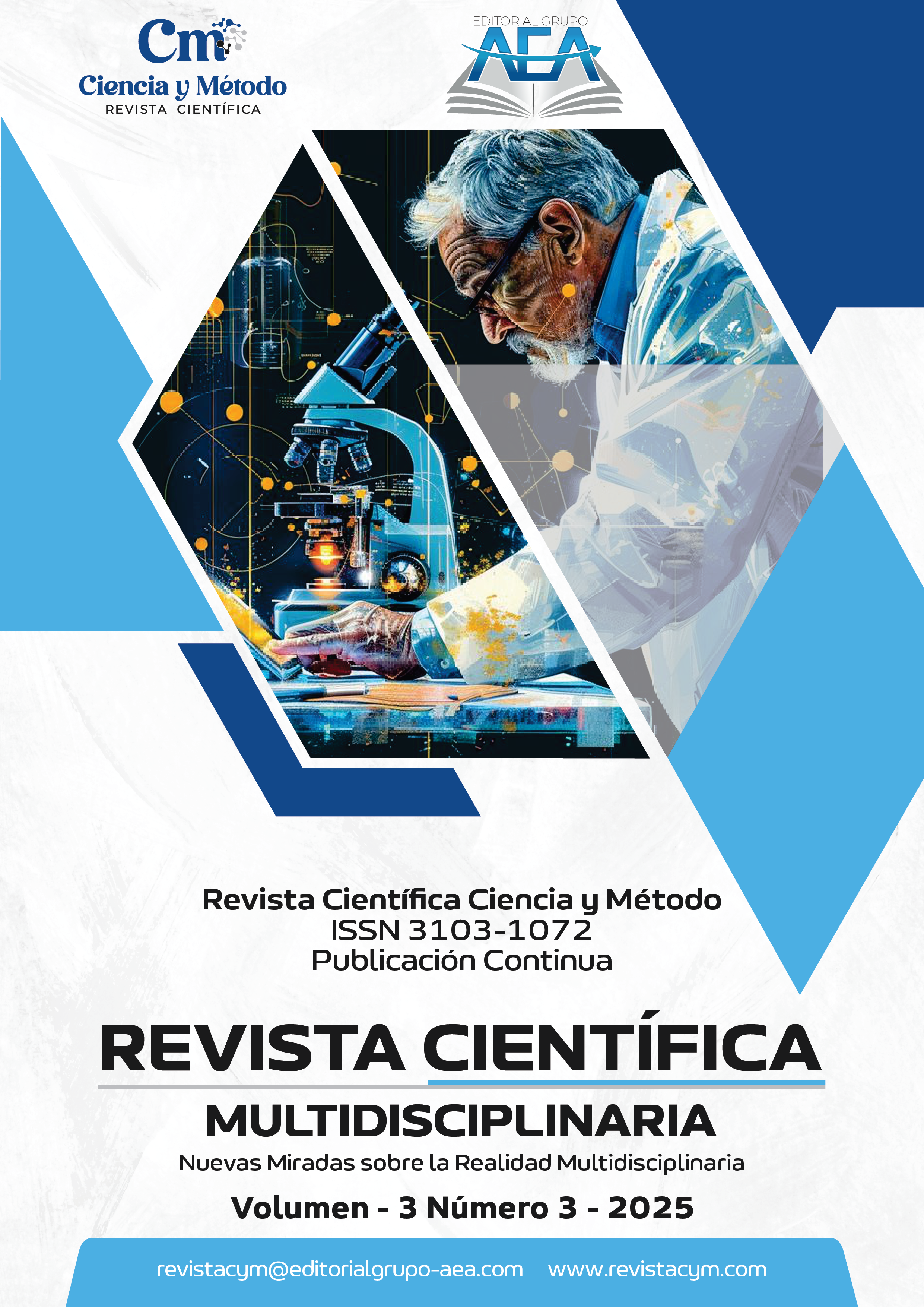Intrafamily problems and their impact on the learning of elementary school students
Main Article Content
Abstract
The present study comprehensively reviews the scientific literature on intrafamily problems and their incidence on the learning of elementary school students. Under an exploratory qualitative approach, a systematic review of academic articles indexed in international databases was carried out. The results show that factors such as marital conflict, emotional neglect and domestic violence generate an environment of chronic stress that affects children's neurobiology, impairs working memory and emotional regulation, and leads to poor academic performance, lack of motivation and behavioral problems. In addition, it was found that these experiences weaken self-esteem and hinder social integration, perpetuating a cycle of educational exclusion. The conclusions underline the need for inter-institutional strategies that combine family intervention and psychoeducational support, as well as preventive programs that promote safe environments that favor the learning and integral development of minors.
Downloads
Article Details
Section

This work is licensed under a Creative Commons Attribution-NonCommercial 4.0 International License.
How to Cite
References
Alomoto Torres, M. M. (2025, 20 de mayo). Impacto de los problemas familiares en el aprendizaje de los estudiantes de séptimo año de educación básica (Tesis de Maestría en Educación Básica). Universidad Estatal Península de Santa Elena. https://repositorio.upse.edu.ec/handle/46000/13537
Avilez-Figueroa, C. M., Apráez-Márquez, S. X., Herrera-Enríquez, V. N., Guiscasho-Chicaiza, D. R., & Gualoto-Díaz, M. C. (2024). Estrategias innovadoras para fomentar el pensamiento crítico en niños de educación preescolar a través de la ciencia. Journal of Economic and Social Science Research, 4(4), 56–72. https://doi.org/10.55813/gaea/jessr/v4/n4/132 DOI: https://doi.org/10.55813/gaea/jessr/v4/n4/132
Casanova-Villalba, C. I., Herrera-Sánchez, M. J., Bravo-Bravo, I. F., & Barba-Mosquera, A. E. (2024). Transformación de universidades incubadoras a creadoras directas de empresas Spin-Off. Revista De Ciencias Sociales, 30(2), 305-319. https://doi.org/10.31876/rcs.v30i2.41911 DOI: https://doi.org/10.31876/rcs.v30i2.41911
Davies, P. T., Martin, M. J., & Cicchetti, D. (2012). Delineating the sequelae of destructive and constructive interparental conflict for children within an evolutionary framework. Development and Psychopathology, 24(3), 985–1001.
Evans, G. W., & Kim, P. (2012). Childhood poverty, chronic stress, self-regulation, and coping. Child Development Perspectives, 7(1), 43–48. https://doi.org/10.1111/cdep.12013 DOI: https://doi.org/10.1111/cdep.12013
Evans, G. W., Li, D., & Whipple, S. S. (2013). Cumulative risk and child development. Psychological Bulletin, 139(6), 1342–1396. https://doi.org/10.1037/a0031808 DOI: https://doi.org/10.1037/a0031808
Fajardo-Garcia, L. M. (2025). Estrategias de enseñanza basadas en el contexto sociocultural en la asignatura de educación para la ciudadanía. Revista Científica Zambos, 4(1), 61-73. https://doi.org/10.69484/rcz/v4/n1/76 DOI: https://doi.org/10.69484/rcz/v4/n1/76
Hair, N. L., Hanson, J. L., Wolfe, B. L., & Pollak, S. D. (2015). Association of child poverty, brain development, and academic achievement. JAMA Pediatrics, 169(9), 822–829. https://doi.org/10.1001/jamapediatrics.2015.1475 DOI: https://doi.org/10.1001/jamapediatrics.2015.1475
Herrera-Sánchez, M. J., Casanova- Villalba, C. I., Moreno-Novillo, Ángela C., & Mina-Bone, S. G. (2024). Tecnoestrés en docentes universitarios con funciones académicas y administrativas en Ecuador. Revista Venezolana De Gerencia, 29(11), 606-621. https://doi.org/10.52080/rvgluz.29.e11.36 DOI: https://doi.org/10.52080/rvgluz.29.e11.36
Holt, S., Buckley, H., & Whelan, S. (2008). The impact of exposure to domestic violence on children and young people: A review of the literature. Child Abuse & Neglect, 32(8), 797–810. https://doi.org/10.1016/j.chiabu.2008.02.004 DOI: https://doi.org/10.1016/j.chiabu.2008.02.004
Kim, J., & Cicchetti, D. (2010). Longitudinal pathways linking child maltreatment, emotion regulation, peer relations, and psychopathology. Journal of Child Psychology and Psychiatry, 51(6), 706–716. https://doi.org/10.1111/j.1469-7610.2009.02202.x DOI: https://doi.org/10.1111/j.1469-7610.2009.02202.x
Madrid-Gómez, K. E., Arias-Huánuco, . J. M., Zevallos-Parave, Y., Alfaro-Saavedra, M. N., Camposano-Córdova, A. I., & Yaulilahua-Huacho, R. (2023). Estrategias activas para el aprendizaje autónomo: Un enfoque en Alumnos de Secundaria. Editorial Grupo AEA. https://doi.org/10.55813/egaea.l.2022.53 DOI: https://doi.org/10.55813/egaea.l.2022.53
Madrid-Gómez, K. E., Herrera-Aponte, M. B., Arias-Huánuco, J. M., Zevallos-Parave, Y., Camposano-Córdova, A. I., & LLancari-Choccelahua, R. B. (2023). Interacciones Familiares y Autoestima: Un Estudio entre Estudiantes de Secundaria. Editorial Grupo AEA. https://doi.org/10.55813/egaea.l.2022.52 DOI: https://doi.org/10.55813/egaea.l.2022.52
Martínez-Pons, M. (2016). The role of parents in children’s academic achievement. Educational Psychology, 37(2), 227–243. https://doi.org/10.1080/01443410.2016.1165799 DOI: https://doi.org/10.1080/01443410.2016.1165799
McLaughlin, K. A., Sheridan, M. A., & Lambert, H. K. (2014). Childhood adversity and neural development: Deprivation and threat as distinct dimensions of early experience. Neuroscience & Biobehavioral Reviews, 47, 578–591. https://doi.org/10.1016/j.neubiorev.2014.10.012 DOI: https://doi.org/10.1016/j.neubiorev.2014.10.012
Mendoza-Macías, M. E., & Barcia-Briones, M. F. (2020). Las relaciones familiares y rendimiento académico en estudiantes de educación básica. Dominio de las Ciencias, 6(Extra 3), 378–394. Pontificia Universidad Católica del Ecuador. https://dialnet.unirioja.es/servlet/articulo?codigo=7491420
Pomerantz, E. M., Moorman, E. A., & Litwack, S. D. (2007). The how, whom, and why of parents' involvement in children's academic lives: More is not always better. Review of Educational Research, 77(3), 373–410. https://doi.org/10.3102/003465430305567 DOI: https://doi.org/10.3102/003465430305567
Sánchez, E. G., & Dávila, O. (2022). Apoyo emocional de la familia y éxito escolar en los estudiantes de educación básica. Revista Estudios Psicológicos, 2(1), 7–29. https://doi.org/10.35622/j.rep.2022.01.001 DOI: https://doi.org/10.35622/j.rep.2022.01.001
Sandra Yadira, F.-R. (2025). Estrategias de aprendizaje autónomo a través de las TIC en estudios sociales: Un enfoque para mejorar la autoeficacia y el rendimiento académico. Revista Científica Zambos, 4(1), 74-86. https://doi.org/10.69484/rcz/v4/n1/77 DOI: https://doi.org/10.69484/rcz/v4/n1/77
Suárez González, A. M. (2025, 20 de mayo). Los problemas intrafamiliares y su impacto en el aprendizaje de estudiantes de décimo grado (Tesis de Maestría en Educación Básica). Universidad Estatal Península de Santa Elena. https://repositorio.upse.edu.ec/handle/46000/13597
Torres-Roberto, M. A., & Solano-Camargo, S. P. (2025). La baja natalidad en Colombia y su impacto en la educación pública y privada. Revista Científica Zambos, 4(2), 240-264. https://doi.org/10.69484/rcz/v4/n2/120 DOI: https://doi.org/10.69484/rcz/v4/n2/120
Vimos-Buenaño, K. E., Viteri-Ojeda, J. C., Naranjo-Sánchez, M. J., & Novillo-Heredia, K. H. (2024). Uso de la inteligencia artificial en los procesos de investigación científica, por parte de los docentes universitarios. Journal of Economic and Social Science Research, 4(4), 215–236. https://doi.org/10.55813/gaea/jessr/v4/n4/143 DOI: https://doi.org/10.55813/gaea/jessr/v4/n4/143





